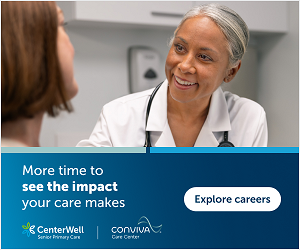Not all at once, just slowly enough that you don’t notice.
“I’m having a rough go at it,” Mr. Robinson confesses. He was listening to me use choppy, challenging vocabulary to piece together what’s landed him in the hospital.
But I know what he’s talking about. The mass in his chest that’s been compressing on his airway, making him so sick, so quickly. He is talking about his pneumonia: the fevers, chills, sleeplessness; the increasing breathlessness, fatigue, and misery. He’s talking about this new chapter in his story.
The words slip away from me: “I’m sorry, but …”
Then, all at once, I realized that it was gone.
I let go of the words like I was in a rush. As if it would have been too much to pause, to let a moment pass, to hold the space between us in silence. The words felt cold, and they spilled from me without emotion. I could not hold his eyes as I said them, but as I retraced my vision, I saw now that he was looking past me.
This was during my intern year of medical residency.
The evidence for compassion in medical care is clear. It works. It reduces health care costs, leads to improved outcomes, increases patient adherence and satisfaction, and even improves physician self-perception and mental health.
In medical school, like most aspiring physicians, my classmates and I participated in robust training aimed at promoting empathy and compassion. We did role-playing in the classroom, worked with standardized patients, and rewatched recordings of our encounters to hone in on our actions. We learned how to identify non-verbal signs of emotion and instances when compassionate engagement was warranted. We practiced specific actions such as maintaining eye contact, displaying facial expressions, and offering a hand to hold. We were trained to acknowledge, support, and validate our patients. We were taught to be calm, patient, and to treat the whole person, not just the disease. I was proud that my medical education had such a focus on humanity.
But the reality of intern year is different. Every day there are emails asking you to complete your notes immediately, text messages prompting you to include higher billing diagnoses in your charting, case managers inquiring about when a patient can leave. We receive training during orientation about Geometric Mean Length of Stay but not on the time it takes to calm a patient. We are told “hospital metrics” are the new trend – no, the new norm, and actually it’s better to be well acquainted if you want to be anybody in today’s world of medicine.
There isn’t a daily circular to spend that extra minute with your patient. There is no incentive to hold space for sorrow, or validation, or silence. Kindness is a nice-to-have in our medical world.
When time is limited, fatigue is persistent, and working memory is restricted, compassion and kindness are the characteristics that suffer first. Everyone who has been a first-year resident has lived this.
The reality of medical training is brutal, and although the events and environments that contribute toward this are varied, the outcomes speak for themselves. Medical residents experience depression and depressive symptoms at over three times the rate of the general population, and the prevalence clearly increases as trainees become more senior. Suicide is the second most common cause of death in medical residents, and suicide as a problem among attending physicians is a behemoth issue in and of itself. But the path to these outcomes is also checkered with hardship.
For a long time, the decay of physician well-being was attributed to burnout. Undue emphasis was placed on training for “resiliency,” establishing healthy well-rounded hobbies, and changing one’s outlook. There was to be ample access to aromatherapy, stress-balls, and mental health counseling for all. But many of us realized that no amount of resilience could right a rotten system.
No amount of training or preparation can alter the reality of a system that is built for efficiency – for increased output. Patients admitted, diagnoses identified, treatments dispensed, outpatient referrals specified, and discharges submitted. As Assistant Professor of Medicine at Harvard Medical School, Dr. Amy Ship aptly summarized, “there is no billing code for compassion.”
Although I am simplifying the world of medicine, the reality is that when you are at the front line, overloaded and overwhelmed, this is what the truth of the world feels like. We went into medicine to make a difference and instead, the emphasis on productivity and efficiency, and making medical decisions based implicitly on financial incentives, leads us to feel morally injured. It depletes us. And we lose sense of who we are and the kindness with which we first came to medicine.
There isn’t a single solution. Attacking the current corporatization of medicine is one front. Disarming insurance giants of their sway over medical decision making is another. Managing the ever-growing burden on resident physicians is yet another.
There are paths to these solutions. Unions offer pragmatic approaches to collective bargaining that enables residents and physicians to demand what is fair and just for themselves and for their patients. Another avenue is to increase political representation and lobbying of officials to begin to unravel the twisted relationship of insurance companies and their meddling with everyday medical decision making. Lastly, each of us can highlight the changes we’ve seen in ourselves as we’ve battled with the medical world.
Continuing to speak about these issues and engaging with one another is how we can continue to make progress. These systems-level changes are necessary to improve our person-level behaviors. We can and should work towards a culture in which residents like me may be able to better offer their compassion.
Qais Iqbal is a radiology resident.

















![Why are medical students turning away from primary care? [PODCAST]](https://kevinmd.com/wp-content/uploads/Design-3-190x100.jpg)



![A physician's reflection on love, loss, and finding meaning in grief [PODCAST]](https://kevinmd.com/wp-content/uploads/Design-4-190x100.jpg)




